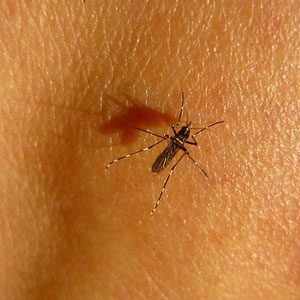Mosquito-Transmitted Diseases on the Increase
By Chris Williams on July 10, 2013.
 The Centers for Disease Control and Prevention recently issued a summary report of West Nile virus and other arboviral diseases in the U.S. for 2012. Arboviruses are diseases that are transmitted to humans primarily through the bites of infected mosquitoes and ticks. In New England, we’re especially concerned about two mosquito-transmitted arboviruses: West Nile virus (WNV) and Eastern equine encephalitis virus (EEEV).
The Centers for Disease Control and Prevention recently issued a summary report of West Nile virus and other arboviral diseases in the U.S. for 2012. Arboviruses are diseases that are transmitted to humans primarily through the bites of infected mosquitoes and ticks. In New England, we’re especially concerned about two mosquito-transmitted arboviruses: West Nile virus (WNV) and Eastern equine encephalitis virus (EEEV).
West Nile virus has been around since 1999, but according to the CDC, there was a large, multistate outbreak of WNV in 2012 with more cases reported nationally than in any year since 2003. New England had a lower rate of West Nile virus than other regions of the U.S., but in 2012 Maine reported its first WNV case. West Nile outbreaks are influenced by weather, number of birds that maintain the virus, number of mosquitoes that spread the virus, and human behavior. Most healthy people don’t get sick from WNV, but some can have serious symptoms including inflammation of the brain.
There were 15 cases of EEEV reported nationwide in 2012, the most since 2005. Seven of the 15 were in Massachusetts, and Vermont reported its first case ever. Eastern equine encephalitis is the most severe of the arbovirus diseases occurring in the U.S., with a 33% fatality rate. Like WNV, the reservoir for EEEV is birds.
More than 90% of the arbovirus cases reported in 2012 occurred from July through September. In previous years, the state of Massachusetts has closed some outdoor public areas where infected mosquitoes were found. Only a small number of mosquitoes are infected with arboviruses at any time, so being bitten doesn’t mean you will get sick. The best insurance against disease is to avoid being bitten. To protect yourself and your family from mosquito arboviruses this summer, EPA recommends the following:
- When going outdoors, apply insect repellent containing N,N,-diethyl-meta-toluamide (DEET) to bare skin and clothing. Mosquitoes may bite through thin clothing. Products containing 10% or less DEET may be the most appropriate for children aged 2 -12 years. Always follow product instructions when using repellents.
- Wear loose-fitting clothing that covers legs and arms while in areas where mosquitoes are likely to be present.
- As much as you can, avoid outdoor activities between dusk and dawn, when mosquito activity is greatest.
- Ensure that window and door screens are in good repair and that other routes of mosquito access to buildings and living spaces are blocked.
- Clean out clogged rain gutters to avoid collecting water where mosquitoes can lay eggs.
- At least once or twice a week, empty water from flowerpots, pet food and water dishes, birdbaths, swimming pool covers, and other items that collect water.
Photo credit: calafellvalo / Foter / CC BY-NC-ND